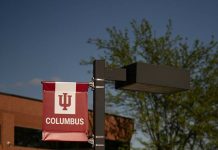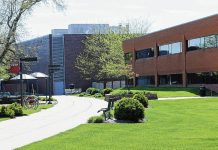A Japanese official who fosters ties between his country and Midwestern states praised the business relationships Columbus and Indiana have with Japan, but expressed concern that U.S. tariffs could harm the successful partnerships.
Naoki Ito, the consul-general of Japan in Chicago, shared such thoughts Tuesday with 368 attendees at the Greater Columbus Economic Development Corp.’s annual meeting at The Commons.
Ito praised the efforts of Indiana governors — including U.S. Vice President Mike Pence, a Columbus native who was the state’s governor from 2012-2016 — for creating a positive environment for direct investment by Japanese-based companies.
Of the 10 Midwestern cities Ito’s consulate serves, Indiana leads the way with 65,000 jobs by nearly 300 Japanese companies, the consul-general said.
[sc:text-divider text-divider-title=”Story continues below gallery” ]Click here to purchase photos from this gallery
“Your leadership is really special,” Ito said. “Indiana sets the example for other states.”
Ito also thanked Greater Columbus EDC President Jason Hester and Columbus Mayor Jim Lienhoop for the city’s present and past relationship building, which has resulted in 28 Japanese companies establishing operations in Columbus that now employ about 6,000 workers.
Hester and Lienhoop will visit Japan in the fall, marking the 37th consecutive year Columbus officials have conducted economic trade missions to the Asian country.
Tariff concerns
However, Ito said Japan views U.S. tariffs unfavorably and worries that they could harm Japanese businesses to the extent that U.S. jobs they have created in Columbus and other cities could be lost.
“We are not happy at all with the way new tariffs were imposed on aluminum and other products,” Ito said.
Trump also is threatening tariffs as high as 25 percent on imported cars and auto parts.
A 25 percent tariff on steel and 10 percent tariff on aluminum from the European Union, Canada and Mexico went into effect June 1. Canada has imposed tariffs on $12.6 billion of U.S. goods, the European Union on more than $3 billion of U.S. goods and Mexico on about $3 billion worth.
Ito noted that the tariffs are allowed in the interest of national security.
However, Japan is one of the strongest allies of the U.S., and tariffs impact Japanese companies doing business in America, he said.
Steel imported from Japan to the U.S. includes specialized products that are needed by the American auto sector, and are subject to tariffs, the consul-general said.
Ito said that if Japan is not granted an exemption from steel tariffs as a country, then the specialized products should be excluded on a product-specific basis.
Continued imposition of tariffs could have negative consequences, such as higher costs to make cars and consequently higher sticker prices. Indiana would be harmed because of the state’s heavy ties to the auto industry, he said.
“Naturally, fewer cars would be sold, the market would contract, jobs would be lost,” Ito said. “Indiana and Columbus would suffer.”
Hester in his remarks cited a report that said the proposed 25 percent tariff on imported cars and auto parts could result in 2 million fewer cars sold in the U.S., 715,000 fewer U.S. jobs and a $4,400 increase in the average price of a car.
The EDC president also noted that most Japanese automotive suppliers in Columbus are either Tier 1 or 2 suppliers to Toyota’s U.S. assembly operations.
Tier 1 suppliers provide parts directly to original equipment manufacturers, while Tier 2 companies supply parts that end up in vehicles without being sold directly to the automakers.
“If fewer Toyota vehicles are sold because of higher prices, presumably there would be fewer Bartholomew County residents employed,” Hester said.
U.S. tariffs might cause Japanese companies to rethink their investment and expansion strategies in the U.S., the consul-general said.
Candidate’s concerns
Among those in the audience who heard Ito’s remarks was Greg Pence, the Republican nominee for Indiana’s 6th congressional district and brother of Vice President Pence.
Ito and Pence had a private meeting before the EDC’s event, the candidate said.
“He asked to talk with me. He shared with me the same concerns,” Pence said.
The candidate acknowledged that tariffs have caused widespread concern.
“It’s a concern for Cummins, a concern for Columbus, a concern for the 6th District. It’s a big concern for me,” said Pence, who owns Exit 76 Antique Mall in Edinburgh and Bloomington Antique Mall.
Columbus-based Cummins Inc., a global power company, has said the impact of trade tariffs and the increased costs of materials will be about a $200 million hit this year to the company, roughly half of which is still to come in the second half of the year.
Pence said he has not met with Cummins leaders yet to hear their concerns directly.
He remains optimistic, though, that something can be worked out with great U.S. partners such as Japan. However, Pence said he doesn’t speak for the Trump administration, so he doesn’t know where any possible changes are headed.
Ito said he had a great meeting with Pence, and noted that Pence listened carefully and attentively to what he had so say.
After the EDC’s annual meeting, Ito’s Columbus schedule included visits with Cummins and NTN Driveshaft to learn about their businesses and their situations with tariffs, the consul-general said.
[sc:pullout-title pullout-title=”Keynote speaker’s key points” ][sc:pullout-text-begin]
Key points made by Naoki Ito, consul-general of japan in Chicago, during his keynote speech Tuesday at the Greater Columbus Economic Development Corp.’s annual meeting at The Commons:
- Indiana and Columbus have created a great environment in which Japanese companies can do business.
- That environment has allowed the companies and the U.S. communities in which they operate to enjoy success, such as company growth and more employees.
- Indiana sets the example for U.S.-Japanese relations.
- Tariffs are not good for the trade relationship between the U.S. and Japan. The consequence could be higher prices on products, fewer products sold and a loss of jobs in the U.S.
[sc:pullout-text-end]




